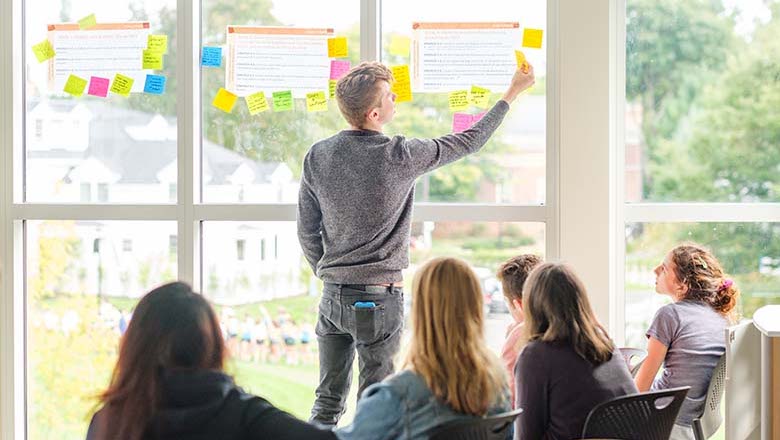They’re not unicorns! Five tips for productive meetings
Whether you have skin in the game or able to play a neutral role, as facilitator, you are there to help guide the room from Point A to Points B, C, and D. You are in charge of keeping the momentum going, ensuring you have created an inclusive agenda, and helping your group meet their goals. So, what do you, as facilitator, do to ensure your meetings are productive?

When was the last time you were thanked for a meeting you ran? Or one that concluded with high fives?
These aren’t unicorn meetings. These are real meetings. With the right facilitation skills, you could be leading meetings that practically make people want to sing out loud.
If you’re like many office workers, you spend a lot of time in meetings. Standing meetings. Check-ins. Team meetings. Brainstorming meetings. Zombie meetings. Why-are-we-even-meeting-this-week meetings.
Poor meeting management is actually a rap sheet of bad habits, maybe because it is helpful to have models of different behaviors before you are willing to try something new. Whether you are struggling through your meeting or trapped in someone else’s, this article is for you.
By picking up some tools in facilitation, you can navigate your way away from unproductive holding patterns in meetings and in the direction of feeling a victorious sense of accomplishment. (WARNING: addictive.)
Becoming an excellent facilitator is all about being willing to change your behavior. As a facilitator, you are there to provide a clear structure so others can focus on content, rather than on meeting mechanics and organization. Whether you have skin in the game or able to play a neutral role, as facilitator, you are there to help guide the room from Point A to Points B, C, and D. You are in charge of keeping the momentum going, ensuring you have created an inclusive agenda, and helping your group meet their goals.
So, what do you, as facilitator, do to ensure your meetings are productive?
1. Figure out why you’re meeting
Before you send out a meeting invite, you should be able to fill out the rest of this sentence: “By the end of the meeting we will accomplish __________.”
By doing this you will have a clear set of meeting goals. You might even realize that a meeting isn’t needed to accomplish this goal. Time is money, and taking people’s time away from other ways they could be productive can take a toll on an organization. So be very thoughtful about the purpose of your meeting.
2. Practice your improv skills
As the facilitator, your job is to move your group through important agenda topics, evolving opinions, and a wide range of potentially challenging behaviors. Sometimes you have to make game-time decisions to deploy Plan B when Plan A fails. Your confidence in these situations will stem from the extent to which you have prepared for a multitude of potential outcomes. At the end of the day, the goals of your meeting are the destination—so plan a few routes in case of detours.
3. Prepare, prepare, prepare
The best way to facilitate a meeting like a pro is to think very carefully about the agenda: the topics, the timing, sequencing, the materials you can send in advance, the materials you’ll need for the meeting, who should present and for how long, booking the meeting room, etc., etc. Your group shouldn’t have to worry about nagging details, such as whether your dry erase markers are fresh or if the computer works—they’re there to get business done. By taking control of logistics, your group can stay focused.
4. Foster trust in the process
Simply put, you need to establish and maintain a culture of productivity for meeting attendees. This process begins and ends with modeling the proper behavior for the meeting (again, this starts with you). This includes coming to meetings prepared before the meeting starts so you are ready to get the meeting started on time. This also includes interacting respectfully with meeting members, making sure that everyone gets a chance to participate, and keeping the meeting on track.
This also means instilling a “no gossip rule” during and outside of meetings. People may want to talk to you about meeting members who exhibited challenging behaviors. It is your job to model trustworthy behavior. Avoid disparaging remarks.
Finally, you can’t know your facilitation blind spots, so ask for help. Create time at the end of the meeting to ask sincerely about feedback, and then take that feedback with you as you prepare for future meetings. Let your group know how you have adjusted your meetings based on prior feedback. This demonstrates that you are game to change and will make them more comfortable doing so as well.
In short, follow the group’s values. By doing so, you demonstrate that you value and respect the group’s principles. Being an enthusiastic, prompt, and hardworking facilitator fosters the sense of trust needed to create a space for openness, honesty, and productivity.
5. Communicate your intentions clearly
Be transparent with all process decisions you make for your group. Before the meeting, prepare a process and explain it before you jump into the agenda as well as during each step along the way. This will not only limit confusion, but will also give your group members a chance to think about the process and help you navigate the journey together.
Whether you’re new at this or an old pro, it is very important to clarify expectations early and often concerning roles, process, timeline, and feedback. Checking in with the group periodically will help avoid confusion or misunderstandings before the end of the meeting.
Meetings are constantly evolving creatures. Facilitators need to be adaptable to any meeting situation they may find themselves in. Through careful planning, preparation, goal-setting, and execution, both before and during your meeting, you might just accomplish what you set out to do—and get those high fives.
If you find yourself in need of additional meeting management skills, GreenerU has an excellent training program for facilitators of all stripes. We’d love to work with you! Contact us to start a conversation today.



